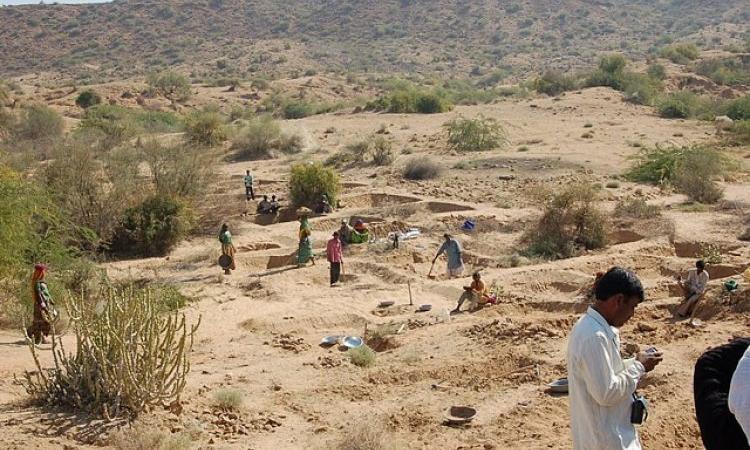
Funds allocated for MGNREGA in the Budget 2023-24 adequate for just 17 days of work
The Budget 2023-24 has earmarked Rs 60,000 crore for MGNREGS, that promises a minimum of 100 days of work. This allocation has been found to be the lowest in the history of MGNREGA in terms of Gross Domestic Product, and has been down to 0.198 percent of the GDP.
Activists have demanded the Centre to allocate a higher budget of Rs 2.72 lakh crore to enable workers to get employment for 100 days. They argue that this meagre allocation will impact timely wage payment, demand for work and creation of quality assets and that at least Rs 1.24 lakh crore is required to provide 40 days of work to all the active job card holders. (DownTo Earth)
Rising sea levels pose major threat to India, Mumbai most vulnerable: WMO report
According to a World Meterological Organisation report, annual global temperatures are rising and the likelihood of temperatures breaching the 1.5°C limit of the Paris Agreement is increasing with time.
The report states that this will lead to faster warming of oceans making countries like India particularly vulnerable because of their vast coastal populations distributed over a 7,500-kilometer-long coastline and divided into nine coastal states, 12 major and 200 minor ports. Mumbai will be the most affected city as sea levels rise around the world. (The Free Post)
Aquifer mapping for entire India to be completed by March this year
The aquifer mapping exercise, an important tool for groundwater resources management is being conducted since 2012 in India. Twenty five lakh square kilometres will be covered under the aquifer mapping exercise out of the total geographical area of 33 lakh square kilometres of the country.
An area of 24.57 sq km has been covered so far, while the remaining will be completed by March this year under the National Aquifer Mapping and Management Programme (NAQUIM). Rajasthan has the largest targeted area (3,34,152 sq km) for coverage under the programme followed by Madhya Pradesh (2,69,349 sq km), Maharashtra (2,59,914 sq km), Uttar Pradesh (2,41,345 sq km) and Karnataka (1,91,791 sq km). (The Times of India)
Plans for 150 hydropower projects in Arunachal Pradesh draw criticism
A recent push by Arunachal Pradesh utilise its massive hydroelectric potential has faced heavy criticism from activists, scientists and communities in the state as well from downstream Assam. Arunachal Pradesh is home to 34 percent (50,328 megawatts) of the country’s 148,701 MW hydropower potential.
Experts fear that the projects may affect downstream areas in Assam. Deforestation and earth cutting for the project upstream will deposit huge amounts of debris and sediments in the rivers changing the behaviour of rivers. Experts warn that massive landslides have already been experienced in the project site at Subansiri Lower Hydroelectric Project at Gerukamukh, which indicate that the Eastern Himalayan part is more susceptible to landslides and the slightest tampering may lead to huge devastation. (DownToEarth).
Gujarat farmers accuse a pesticide production company for distorting their crops, demand compensation
Cotton farmers of Bharuch district in Gujarat have accused Meghmani Organics Limited, a factory in their vicinity for causing deformities and distortions to their crops.
During the cotton farming season of 2021, over 18000 farmers from 280 villages of Bharuch district suffered from economic losses due to crop damage, covering thousands of acres of land. Farmers have blamed the excessive production of a herbicide called 2,4-Dichlorophenoxyacetic acid at the factory to the distortion of leaves and plants in their fields.
The farmers have filed a petition in the Gujarat high court against the state bodies and the private company, demanding compensation and remedial action. (Mongabay).
This is a roundup of important news updates from February 1 - February 15, 2023. Also view our policy matters this fortnight here.
/articles/low-mgnrega-allocation-puts-poor-risk